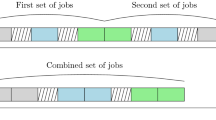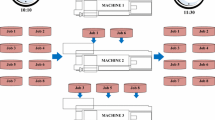Abstract
Many multiple objective genetic algorithms have been developed to approximate the efficient frontier of solutions for multiple objective optimization problems. However, only a limited number of comparison studies have been performed on practical problems. One of the reasons for this may be the lack of commonly accepted measures to compare the solution quality of sets of approximately optimal solutions. In this paper, we perform an extensive set of experiments to quantitatively compare the solutions of two competing algorithms for a bi-criteria parallel machine-scheduling problem.
Access this chapter
Tax calculation will be finalised at checkout
Purchases are for personal use only
Preview
Unable to display preview. Download preview PDF.
Similar content being viewed by others
References
Aksoy, Y., T. W. Butler and E. D. Minor, (1996) Comparative studies in interactive multiple objective mathematical programming, European Journal of Operational Research, 89, 408–422.
Cochran, J. K., S.-M. Horng, and Fowler, J. W., (2000), A Multi Population Genetic Algorithm to Solve Parallel Machine Scheduling Problem with Sequence Dependent Setups. Working Paper, Arizona State University, Department of Industrial Engineering.
Coello, C. A. C., (Aug., 1999), A Comprehensive Survey of Evolutionary-Based Multiobjective Optimization Techniques, An International Journal of Knowledge and Information Systems, 1(3):269–308.
Czyzak, P. and A. Jaszkiewicz, (1998). Pareto Simulated annealing — A Metaheuristic Technique for Multiple-Objective Combinatorial Optimization. Journal of Multi-Criteria Decision Analyses, 7, 34–47.
Daniels, R. L., (1992). Analytical evaluation of multi-criteria heuristics. Management Science, 38(4), 501–513.
De, P., J. B. Ghosh, and C. E. Wells, (1992), Heuristic Estimation of the Efficient Frontier for a Bi-Criteria Scheduling Problem. Decision Sciences, 23, 596–609.
Kim B., E. S. Gel, M. W. Carlyle, J. W. Fowler, (2000), A new technique to compare algorithms for bi-criteria combinatorial optimization problems, submitted to Proceedings of the 15th International Conference on Multiple Criteria Decision Making, to appear.
Louis, S. J. and G. J. E. Rawlins, (1993), Pareto-optimality, GA-easiness and Deception. Proceedings of the International Conference on Genetic Algorithms, 118–123.
Murata, T., H. Ishibuchi, and H. Tanaka, (1996), Multi-objective genetic algorithm and its application to flowshop scheduling. Computers and Industrial Engineering, 30(4), 957–968.
Myers, R. H. and D.C. Montgomery, (1995), Response Surface Methodology — Process and Product Optimization Using Designed Experiments, John Wiley & Sons, New York.
Pinedo, M., (1995), Scheduling: Theory, Algorithms, and Systems. Prentice Hall, New Jersey.
Schaffer, J.D., (1985), Multiple objective optimization with vector evaluated genetic algorithms. Proceedings of the First International Conference on Genetic Algorithms, 93–100.
Serifoglu, F. S. and G. Ulusoy, (1999), Parallel Machine Scheduling with Earliness and Tardiness Penalties. Computers & Operations Research, 26, 773–787.
Valenzuela-Rendon, M. and E. Uresti-Charre, (1997), A Non-Generational Genetic Algorithm for Multiobjective Optimization, Proceedings of the International Conference on Genetic Algorithms, pp 658–665
Viana, A. and J. P. Sousa, (2000). Using metaheuristics in multi-objective resource constrained project scheduling. European Journal of Operations Research, 120, 359–374.
Zitzler, E. and L. Thiele, (Sep. 1998), Multiobjective Optimization Using Evolutionary Algorithms — A Comparative Case Study. In A. E. Eiben, Editor, Parallel Problem Solving from Nature V, 292–301, Amsterdam, Springer-Verlag.
Author information
Authors and Affiliations
Editor information
Editors and Affiliations
Rights and permissions
Copyright information
© 2001 Springer-Verlag Berlin Heidelberg
About this paper
Cite this paper
Matthew Carlyle, W., Kim, B., Fowler, J.W., Gel, E.S. (2001). Comparison of Multiple Objective Genetic Algorithms for Parallel Machine Scheduling Problems. In: Zitzler, E., Thiele, L., Deb, K., Coello Coello, C.A., Corne, D. (eds) Evolutionary Multi-Criterion Optimization. EMO 2001. Lecture Notes in Computer Science, vol 1993. Springer, Berlin, Heidelberg. https://doi.org/10.1007/3-540-44719-9_33
Download citation
DOI: https://doi.org/10.1007/3-540-44719-9_33
Published:
Publisher Name: Springer, Berlin, Heidelberg
Print ISBN: 978-3-540-41745-3
Online ISBN: 978-3-540-44719-1
eBook Packages: Springer Book Archive




